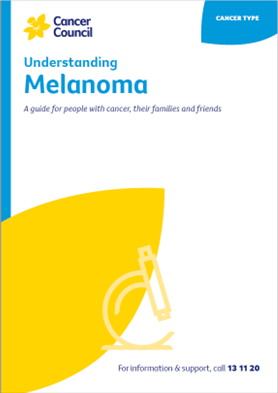- Home
- Melanoma
- Treatment for early melanoma
- Making treatment decisions
Making treatment decisions for melanoma
Sometimes it is difficult to decide on the type of treatment to have. You may feel that everything is happening too fast, or you might be anxious to get started.
Check with your specialist how soon treatment should begin, as it may not affect the success of the treatment to wait a while. Ask them to explain the options, and take as much time as you can before making a decision.
Learn more about:
- Knowing your options
- Recording the details
- Asking questions
- Considering a second opinion
- Deciding on treatment
- Joining a clinical trial
- Video: What are clinical trials?
- Podcast: Making Treatment Decisions
Know your options
Understanding the disease, the available treatments, possible side effects and any extra costs can help you weigh up the options and make a well-informed decision. Check if the specialist is part of a multidisciplinary team and if the treatment centre is the most appropriate one for you – you may be able to have treatment closer to home, or it might be worth travelling to a centre that specialises in a particular treatment.
Record the details
When your doctor first says you have cancer, you may not remember everything you are told. Taking notes can help. If you would like to record the discussion, ask your doctor first. It is a good idea to have a family member or friend go with you to appointments to join in the discussion, write notes or simply listen.
Ask questions
If you are confused or want to check anything, it is important to ask your specialist questions. Try to prepare a list before appointments. If you have a lot of questions, you could talk to a cancer care coordinator or nurse.
Consider a second opinion
You may want to get a second opinion from another specialist to confirm or clarify your specialist’s recommendations or reassure you that you have explored all of your options. Specialists are used to people doing this.
Your GP or specialist can refer you to another specialist and send your initial results to that person. You can get a second opinion even if you have started treatment or still want to be treated by your first doctor. You might decide you would prefer to be treated by the second specialist.
It’s your decision
Adults have the right to accept or refuse any treatment that they are offered. For example, some people with advanced cancer choose treatment that has significant side effects even if it gives only a small benefit for a short period of time. Others decide to focus their treatment on quality of life. You may want to discuss your decision with the treatment team, GP, family and friends.
For more on this, see Cancer Care and Your Rights.
Should I join a clinical trial?
Your doctor or nurse may suggest you take part in a clinical trial. Doctors run clinical trials to test new or modified treatments and ways of diagnosing disease to see if they are better than current methods.
For example, if you join a randomised trial for a new treatment, you will be chosen at random to receive either the best existing treatment or the modified new treatment. Over the years, trials have improved treatments and led to better outcomes for people diagnosed with cancer.
You may find it helpful to talk to your specialist, clinical trials nurse or GP, or to get a second opinion. If you decide to take part in a clinical trial, you can withdraw at any time.
For more information, see Clinical trials and research. To find current clinical trials near you, visit Cancer Institute NSW or Australian Cancer Trials.
Video: What are clinical trials?
In this video, Medical Oncologist Dr Elizabeth Hovey explains what clinical trials are and how they can improve cancer treatment.
Podcast: Making Treatment Decisions
Listen to more episodes from our podcast for people affected by cancer
More resources
Prof H Peter Soyer, Chair in Dermatology and Director, Dermatology Research Centre, The University of Queensland, Diamantina Institute, and Consultant, Dermatology Department, Princess Alexandra Hospital, QLD; A/Prof Matteo Carlino, Medical Oncologist, Blacktown and Westmead Hospitals, Melanoma Institute Australia and The University of Sydney, NSW; Prof Anne Cust, Deputy Director, The Daffodil Centre, The University of Sydney and Cancer Council NSW, Chair, National Skin Cancer Committee, Cancer Council and faculty member, Melanoma Institute Australia; Prof Diona Damian, Dermatologist, Head of Department, Dermatology, The University of Sydney at Royal Prince Alfred Hospital, NSW, and Melanoma Institute Australia; A/Prof Paul Fishburn, General Practitioner – Skin Cancer, Norwest Skin Cancer Clinic, NSW and The University of Queensland; Claire Kelly, National Support Manager, and Emma Zurawel, Telehealth Nurse, Melanoma Patients Australia; Prof John Kelly, Consultant Dermatologist, Victorian Melanoma Service, The Alfred Melbourne and Monash University, VIC; Liz King, Manager, Skin Cancer Prevention Unit, Cancer Council NSW; Lee-Ann Lovegrove, Consumer; Lynda McKinley, 13 11 20 Consultant, Cancer Council Queensland; Angelica Miller, Melanoma Community Support Nurse, Melanoma Institute Australia incorporating melanomaWA, and Cancer Wellness Centre, WA; Dr Amelia Smit, Research Fellow, Melanoma and Skin Cancer, The Daffodil Centre, The University of Sydney and Cancer Council NSW; Prof Andrew Spillane, Professor of Surgical Oncology, The University of Sydney, The Mater and Royal North Shore Hospitals, NSW, and Melanoma Institute Australia; Kylie Tilley, Consumer; A/Prof Tim Wang, Radiation Oncologist, Crown Princess Mary Cancer Centre, Westmead Hospital, NSW. We also thank the health professionals, consumers and editorial teams who have worked on previous editions of this title.
View the Cancer Council NSW editorial policy.
View all publications or call 13 11 20 for free printed copies.



